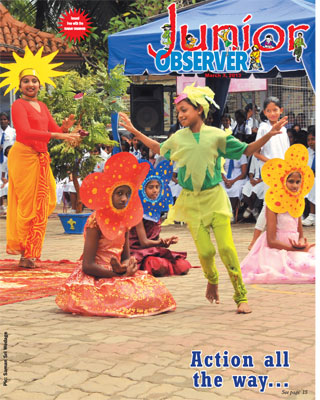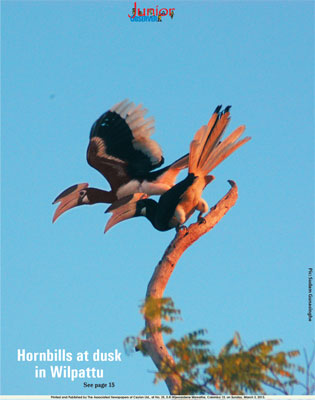Cover Story
Kumaratunga Munidasa- a well-known Sinhala writer
Our cover picture is a scene from a play this versatile writer has
written. We give our little readers some news about this well-known
writer and we are sure you will value this information.
 Kumaratunga Munidasa, entered the Buddhist School in Dikwelle for his
early education. Later he attended St. Thomas' College in Matara. After
that he went to the Dikwella Watarukanna Pirivena to learn Sanskrit and
Pali to become a Buddhist monk. However, due to the dissatisfaction of
his family, Kumaratunga Munidasa left Dikwella Watarukanna Pirivena and
attended the Government Teachers' College, Colombo in 1905. He graduated
in 1907, after two years of training. Kumaratunga Munidasa wrote Nikaya
Sangraha Vivaranaya,his first book, while he was still in school. Kumaratunga Munidasa, entered the Buddhist School in Dikwelle for his
early education. Later he attended St. Thomas' College in Matara. After
that he went to the Dikwella Watarukanna Pirivena to learn Sanskrit and
Pali to become a Buddhist monk. However, due to the dissatisfaction of
his family, Kumaratunga Munidasa left Dikwella Watarukanna Pirivena and
attended the Government Teachers' College, Colombo in 1905. He graduated
in 1907, after two years of training. Kumaratunga Munidasa wrote Nikaya
Sangraha Vivaranaya,his first book, while he was still in school.
He wrote many books in many languages - in Sinhala, English,
Sanskrit, Pali, Tamil, Greek, Malayalam and Latin. Munidasa revived the
Lakminipahana, one of the oldest Sinhala newspapers.
He also started two magazines to promote and teach the correct way of
using the Sinhala language.In 1941 Kumaratunga Munidasa founded the Hela
Havula (Pure Sinhala Fraternity), a Sinhala Literary Organization. The
organization consisted of many people who shared Munidasa's idiom. They
frequently engaged in debates that centred around many aspects of
literature.
Hela Havula is considered as a starting point for many Sri Lankan
artistes and scholars. The organization is still active and helps many
young artistes to sharpen their literary skills. Munidasa always used to
point out that Country, Language, and Nation were his triple gems, and
also stressed the importance of the Sinhala language, as being the
emblem of national identity of the Sinhalese. He was awarded the Viwarna
Swakthi title for his excellent work on the history of Sinhala
Literature.
Munidasa Kumaratunga passed away on March 2, 1944 at the age of 56.
Back Cover Story
 This is a picture of the Malabar Pied Hornbill taken through the
lenses of Sudam Gunasinghe on a visit to Wilpattu. He captured this pair
of hornbills attempting to take flight after mating which is a natural
phenomenon among hornbills. The Malabar Pied Hornbill (Anthracoceros
coronatus) also known as lesser Pied Hornbill, is in fact a hornbill. This is a picture of the Malabar Pied Hornbill taken through the
lenses of Sudam Gunasinghe on a visit to Wilpattu. He captured this pair
of hornbills attempting to take flight after mating which is a natural
phenomenon among hornbills. The Malabar Pied Hornbill (Anthracoceros
coronatus) also known as lesser Pied Hornbill, is in fact a hornbill.
Hornbills are a family of tropical birds. The Malabar Pied Hornbill
is a common resident breeder in tropical southern Asia from India and
Sri Lanka East to Borneo. Its habitat is evergreen and moist deciduous
forests, often near human settlements.
During incubation, the female lays two or three white eggs in a tree
hole, which is blocked off with a cement made of mud, droppings and
fruit pulp.
There is only one narrow aperture, just big enough for the male to
transfer food to the mother and the chicks. When the chicks have grown
too large for the mother to fit in the nest with them, the mother breaks
out and rebuilds the wall, after which both parents feed the chicks.
The Malabar Pied Hornbill is a large hornbill, at 65 cm in length. It
has mainly black plumage apart from its white belly, throat patch, tail
sides and trailing edge to the wings. The bill is yellow with a large,
mainly black casque. Females have white orbital skin which is not there
in the case of males. Juveniles don't have the casque. |



